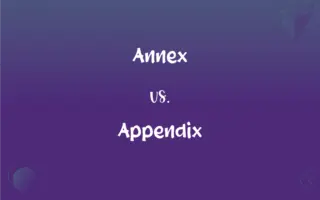Spoiled vs. Spoilt: What's the Difference?
Edited by Aimie Carlson || By Harlon Moss || Updated on October 16, 2023
"Spoiled" and "spoilt" both mean ruined or overindulged; "spoiled" is more common in American English, while "spoilt" is preferred in British English.

Key Differences
Both "spoiled" and "spoilt" are used to describe something that has been damaged or made less perfect. While "spoiled" is favored in American English, "spoilt" is more commonly used in British English.
Items, especially food, that are no longer good to use or consume can be described as "spoiled" or "spoilt." However, in American contexts, one might hear "the milk has spoiled," whereas in British contexts, "the milk has spoilt" might be used.
When referring to a person, especially a child, who is overindulged or receives too many privileges, both "spoiled" and "spoilt" can be employed. In American English, someone might say "a spoiled child," whereas in British English, it could be "a spoilt child."
The past tense of the verb "spoil" can also be either "spoiled" or "spoilt." For instance, in American English, one might say "the surprise was spoiled," while in British English, "the surprise was spoilt" might be preferred.
Both words, regardless of their spelling, convey the idea of something being made less perfect or pure. Yet, the choice between "spoiled" and "spoilt" often boils down to regional preferences and the audience being addressed.
ADVERTISEMENT
Comparison Chart
Predominant Usage
American English
British English
Referring to Damaged Goods
The food has spoiled.
The food has spoilt.
Describing Overindulgence
She's a spoiled child.
She's a spoilt child.
Past Tense of "Spoil"
The movie was spoiled for me.
The movie was spoilt for me.
Part of Speech
Adjective, verb (past tense)
Adjective, verb (past tense)
ADVERTISEMENT
Spoiled and Spoilt Definitions
Spoiled
Describes someone overindulged.
The spoiled child demanded more toys.
Spoilt
Describes someone given excessive indulgence.
The spoilt kid never heard the word no.
Spoiled
Indicates the past tense of "spoil."
She spoiled the surprise.
Spoilt
Conveys something losing its initial worth.
The beautiful landscape was spoilt by litter.
Spoiled
Refers to something made imperfect.
The spoiled fruit was thrown away.
Spoilt
Represents the past tense of "spoil" in British English.
He spoilt the ending for everyone.
Spoiled
Relates to goods, especially food, that's gone bad.
The milk smelled like it was spoiled.
Spoilt
Pertains to items, primarily food, that's no longer good.
The spoilt eggs had to be discarded.
Spoiled
Signifies something that has lost its original value.
The view was spoiled by the construction.
Spoilt
Denotes something that's become imperfect.
The spoilt wine had a sour taste.
Spoiled
To impair or destroy the quality or value of; ruin
Spoiled the dish by adding too much salt.
Spoilt
A past tense and a past participle of spoil.
Spoiled
To impair or destroy the enjoyment or experience of
Spoiled the movie by talking throughout it.
Spoilt
(UK) Having lost its original value
FAQs
How about describing food that's gone bad?
Both words can indicate food that's no longer fit for consumption.
And in British English?
"Spoilt" is favored in British English.
Are "spoiled" and "spoilt" synonyms?
Yes, they essentially mean the same thing but have regional preferences.
Which is preferred in American English?
"Spoiled" is more common in American English.
Can "spoiled" and "spoilt" be used interchangeably?
While they can, considering the audience's regional preferences can be helpful.
Can "spoiled" be used in British English?
While "spoilt" is more common, "spoiled" is also understood and occasionally used.
Do these words have noun forms?
The noun form is "spoil" as in "the spoils of war."
Can both words describe a person?
Yes, both can describe someone, especially a child, who's overindulged.
Can "spoiled" describe a positive situation?
Rarely. It usually indicates something negative, but context is key.
How about "spoilt"? Any positive contexts?
Like "spoiled," "spoilt" typically has negative implications.
How do I decide which to use in writing?
Consider the intended audience's regional preferences.
How should I use these words as a past tense verb?
Depending on the audience: "spoiled" for American English and "spoilt" for British English.
Can either word describe a landscape?
Yes, a landscape marred by unsightly elements can be described as "spoiled" or "spoilt."
Are there other verb forms of "spoil"?
Yes, "spoiling" as the present participle and "spoils" as the third-person singular.
Are there idioms involving these words?
Yes, like "to spoil for a fight" meaning eager for a confrontation.
Do these words have negative connotations?
Generally, both carry a negative connotation, indicating imperfection or excess.
Are there regional exceptions?
While the general rule stands, individual preferences and exposure to global English can vary usage.
Is "spoilt" found in American literature?
It can be, especially if the writing aims for a more global or British tone.
Can these words apply to non-tangible things?
Yes, like "spoiled plans" or "spoilt mood."
Are there other words similar to "spoiled" and "spoilt"?
Yes, words like "ruined" or "tainted" can be similar in some contexts.
About Author
Written by
Harlon MossHarlon is a seasoned quality moderator and accomplished content writer for Difference Wiki. An alumnus of the prestigious University of California, he earned his degree in Computer Science. Leveraging his academic background, Harlon brings a meticulous and informed perspective to his work, ensuring content accuracy and excellence.
Edited by
Aimie CarlsonAimie Carlson, holding a master's degree in English literature, is a fervent English language enthusiast. She lends her writing talents to Difference Wiki, a prominent website that specializes in comparisons, offering readers insightful analyses that both captivate and inform.






































































